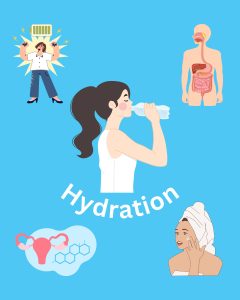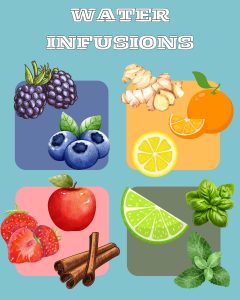26
Hydration
 Hydration is essential for maintaining overall health and wellness, particularly for women. It involves more than just responding to feelings of thirst; adequate hydration plays a vital role in various bodily functions. Drinking sufficient water can improve skin quality, enhance energy levels, and support cognitive function and digestion.
Hydration is essential for maintaining overall health and wellness, particularly for women. It involves more than just responding to feelings of thirst; adequate hydration plays a vital role in various bodily functions. Drinking sufficient water can improve skin quality, enhance energy levels, and support cognitive function and digestion.
While many people may struggle to consume enough water throughout the day, there are several effective strategies to boost your water intake. These methods not only help ensure proper hydration but also contribute to overall well-being, allowing you to feel your best and live life to the fullest. Incorporating these practices into your daily routine can make hydration an effortless part of your lifestyle.
How much water should I consume in 1 day?
Integrating sufficient water into your daily routine is essential for digestive health and overall physical well-being. Aiming for approximately 8-10 cups of fluid each day can help maintain appropriate hydration levels, though individual requirements may vary depending on factors such as activity level, climate, and personal health considerations. A common guideline suggests drinking half your body weight in ounces of water. Additionally, pregnant women and breastfeeding mothers are advised to increase their water intake.
Benefits of proper hydration:
Digestion:
Hydration plays a valuable role in maintaining digestive health, and understanding its benefits can help us optimize our overall well-being. Here are some key points to consider:
- Assistance in Digestion: Water is essential for the breakdown of food. Proper hydration enables the body to effectively digest food and absorb vital nutrients, which are crucial for energy and overall health.
- Impact of Dehydration: When the body is dehydrated, the digestive system may slow down, leading to issues like bloating, irritation, and indigestion. Staying hydrated encourages optimal digestive function.
- Lubrication of the Digestive Tract: Staying well-hydrated provides necessary lubrication to the digestive system. This lubrication helps reduce constipation and encourages consistent bowel movements, making digestion smoother and more effective.
- Reduction of Indigestion and Acid Reflux: Adequate hydration can help lower the risk of indigestion and acid reflux by ensuring the digestive tract is well-regulated and maintaining the right balance of stomach acids.
- Support During Menstruation: Many women experience digestive problems during their menstrual cycle. Drinking adequate water can help to alleviate bloating and discomfort.
Energy:
When you’re feeling tired in the afternoon, it might be tempting to reach for a cup of coffee. However, a healthier alternative is to drink a glass of water. Proper hydration is crucial for supporting energy levels, as our bodies rely on water to function efficiently.
Dehydration can lead to lethargy because when your body lacks adequate water, it must exert more effort to pump blood and deliver oxygen to your muscles and organs. This increased strain can leave you feeling drained and fatigued.
To combat this, aim to drink water consistently throughout the day. Regular hydration can help maintain your energy levels, improve concentration, and enhance overall physical performance. Making water your go-to choice supports your body’s essential functions and helps stave off that afternoon slump.
Hormones:
Hormones are key players in women’s overall health, impacting everything from emotional balance to metabolism. Their impact is profound, shaping not just how we feel mentally but also how our bodies function. Understanding this connection can empower women to take charge of their health and well-being. One of the key factors in maintaining hormonal balance is adequate hydration.
When the body is dehydrated, it can lead to increased stress levels, which trigger the release of stress hormones, such as cortisol. Elevated cortisol can result in hormonal imbalances, impacting various bodily functions. Thus, staying hydrated is essential for the endocrine system to function properly, ensuring that hormones are distributed effectively throughout the body.
This is especially important during times of major hormonal changes, such as menstruation, pregnancy, and menopause. These life stages can cause significant fluctuations in hormone levels, making hydration even more crucial. Proper water intake can reduce or eliminate common symptoms associated with hormonal changes, such as bloating and fatigue.
By emphasizing ample hydration, women can nurture their hormonal health, reduce the adverse effects of hormonal fluctuations, and promote overall well-being.
Skin:
Hydration is essential for maintaining healthy skin, as it plays a crucial role in keeping skin cells supple. When the body is well-hydrated, skin cells can retain the right amount of moisture, leading to a more youthful appearance by decreasing the visibility of fine lines and wrinkles. In contrast, dehydrated skin may manifest as dryness, patchiness, uneven texture, and increased sensitivity.
Moreover, adequate hydration aids in the elimination of toxins from the body, promoting overall skin health. This process can help combat skin issues such as acne and eczema, creating a clearer and more even skin texture and tone. For women, focusing on hydration can create a remarkable difference in their skin’s appearance, making it vital to prioritize fluid intake and use moisturizers that support hydration. By understanding the benefits of hydration, individuals can take proactive steps toward achieving and maintaining healthy, vibrant skin.
Hydration tips:
Water infusions:
Infused water is a refreshing way to enhance hydration while providing additional flavors and potential health benefits.
- Health Benefits: Adding fruits and herbs to water improves taste and provides vitamins, antioxidants, and other beneficial compounds. For example, citrus fruits are high in Vitamin C, while berries are packed with antioxidants.
- Flavor Variety: Experimenting with different fruits like strawberries, blueberries, and oranges can create a range of flavors. Each fruit brings its unique taste, so feel free to mix and match to find combinations you enjoy.
- Herbal Infusions: Incorporating herbs like mint, basil, or rosemary can add an aromatic element to your water. Mint is known for its refreshing taste, while basil can provide a slightly sweet flavor that complements fruits well.
- Easy Preparation: Making infused water is simple. Just slice or muddle your chosen fruits and herbs, add them to a jar or pitcher of water, and let the mixture sit for a few hours (or even overnight) in the refrigerator to fully infuse.
- Hydration Incentive: For those who find plain water boring, infused water can encourage more fluid intake, which is essential for overall health. Staying hydrated helps with digestion, skin health, and energy levels.
- Calorie-Friendly: Unlike sugary drinks, infused water typically has few to no calories, making it a great alternative for those looking to reduce their caloric intake.
- Seasonal Inspirations: Use seasonal fruits and herbs to create unique blends. In summer, try watermelon and mint, while in fall, consider cinnamon with apples for a warm flavor.
Create a routine:
Staying properly hydrated is crucial for maintaining overall health and well-being. Here are some effective strategies to help you achieve your hydration goals:
- Set Clear Hydration Goals: Try for a minimum of 8 glasses of water a day. You can adapt this based on your individual needs, daily exertion, and climate.
- Use Apps: Download hydration apps that prompt you to drink water during the day. These can provide alerts and track your intake, ensuring you stay on track.
- Incorporate Variety: If plain water isn’t appealing, try herbal teas or sparkling water to mix things up while still keeping hydrated.
- Start Your Day Right: Begin each morning with a glass of water. This not only rehydrates your body after sleep but also boosts your metabolism.
- Use a Reusable Water Bottle: Carrying a reusable water bottle serves as a constant cue to hydrate. It’s also environmentally friendly!
- Schedule Reminders: Set reminders on your phone for designated water breaks, such as after lunch or during mid-afternoon slumps. This helps in establishing a routine.
- Pair Water with Activities: Make it a habit to drink water during daily activities—such as with each meal or snack—to reinforce the behavior.
- Gradual Habit Formation: If these habits feel overwhelming, implement them one at a time. Slowly build up to your goals until it becomes routine.
By following these tips, you can improve your hydration habits and contribute to better health outcomes over time.
Explore
References:
Ms. Medicine. (2024, July 17). Stay hydrated, stay vibrant: How hydration transforms women’s health. https://www.msmedicine.com/blog/stay-hydrated-stay-vibrant-how-hydration-transforms-womens-health#:~:text=Benefits%20for%20Women’s%20Health&text=Water%20helps%20to%20regulate%20the,fluctuations%20are%20at%20their%20peak.
